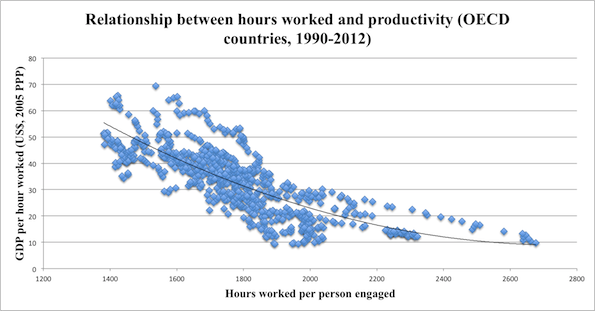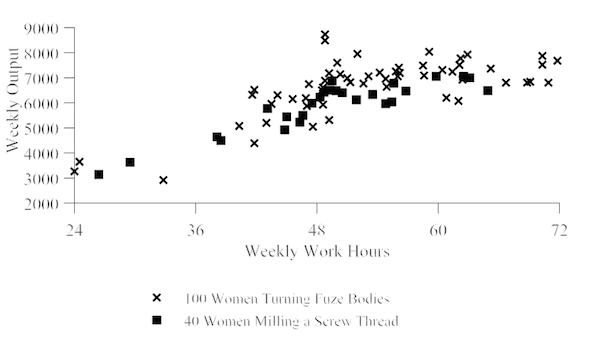You have probably heard the phrase “less is more” in conversations with friends or work colleagues. I know I use it and hear it quite often. When delivered in the right conversational context, this phrase makes great sense, and people usually nod their heads in agreement. However, on paper, the logic underlying this phrase is counter intuitive and potentially self-defeating. Let’s explore this phrase just a bit!
In this post, I will use the example of working hours, but the same wisdom bears out in other aspects of life, such as hobbies, food consumption, etc.
“Less”
In a strict sense, the “less” in the phrase “less is more” would imply that having nothing would be optimal; however, that is not what the phrase intends. In the case of working hours, people saying this phrase are not advocating for no work. Instead, they mean that having too much work is problematic. Hence, “less is more” is mostly a call for balance, rather than a call for absence.
Macro Evidence
Before moving on, let’s check the logic in the idea that “less is more” when it comes to working hours. That seems like a bold statement in a society that worships work. Yet dialing back your workload would be beneficial to both you, but also to your employer.
Indeed, evidence suggests that organizations would be better off if they did not require long hours of their employees. Consider the following data from the Organisation for Economic Co-operation and Development (OECD):

Here, we see that a country’s GDP per hour worked goes up when the hours worked per person is less. Stated differently, when the average employee is working fewer hours, their per-hour productivity is higher. There are therefore diminishing returns to GDP when employees work more.
Micro Evidence
Looking at the previous chart, you may think that comparing countries is an unfair comparison, given the complexities involved. Yet, other studies corroborate this evidence at the organization level, such as one study examining employees engaged in the exact same munitions work during World War I. Rather than comparing countries, this study compares employees engaged in the same, mundane tasks:

Here, employees who worked 48 hours produced more—even compared to those who worked upward of 72 hours! The data show that beyond 48 hours, productivity began to level out, and even began to slightly fall.
I find it intriguing that this is manual labor. When it comes to complex, cognitively taxing work, the inflection point of optimal hours worked may be even less. This is because the opportunity for errors (and corresponding re-work) goes up with increased work complexity.
Thus, less is indeed more when it comes to working hours. The take away from these findings is that we should be wise in setting work schedules. It is wrong to think that working more will always lead to higher levels of productivity.
“More”
The “more” in the phrase implies that there is something to be gained from “less.” One notion that does not get its deserved attention when discussing working hours is opportunity cost—or what you are giving up to work more hours.
On this point, the phrase is more convincing to those who find meaning in their non-work life. Provided that employees are not just binging on Netflix during their off-work time, there are real gains to be had by working less—gains that serve individuals’ higher life goals.
For example, to individuals who maintain the goal of raising a loving, successful family, working less equips these individuals with the time and energy they can devote to teaching their children by way of co-experience, laughter, and play. To individuals who strive to maintain their physical health, working less enables them to exercise and prepare healthy meals. To individuals who aspire to be of service to their communities, working less provides the opportunity to help others in ways that are more helpful than producing yet another widget.
Ironically, working less can provide us with gains toward career-related goals, too. There is cause to expect that focusing on non-work goals enriches our work life. Being successful outside of work can spill over to our work domain, providing us with added skills and resources. When considering the diminishing returns of working hours, even the most ambitious careerist should consider toning down their workload.
In short, the “more” in “less is more” is another case for this phrase’s prudence.
Beware of the Downsides of the “More is More” Mentality
I see too many people embrace the “more is more” mentality, and this troubles me. “More is more” is in fact celebrated in our competitive, social comparison culture. Consider the corporate rat race, the increased size of homes, or zero-sum sporting events. We praise the workaholic employee, the relative with the mansion, and the football player who never rests. But I wonder exactly how many workaholics are on track for a divorce, how many mansion owners face foreclosure, and how many football players are on track for permanent physical or mental health damage (or death) due to this celebrated “more is more” mentality.
Meanwhile, who is not celebrated? The individual who says no to the executive promotion for fear of losing her marriage and family relationships, the homeowner who chooses a more modest home to ensure that she can live within her means, and the football player who only makes second string because he refused to sacrifice his health for the sport’s sake. These are all uncelebrated individuals in our society. I applaud the pioneering efforts to recognize these individuals, such as at the Tokyo Olympics. But these headlines are incredibly rare. The implication? Embracing the less is more mentality requires courage.
Call to Action
What is the individual and societal cost of praising those who take such extreme measures to win? And is the victory worth the cost? With a broadened view of success that realizes true costs, the answer is probably no. And really, this is where the wisdom in “less is more” is found.
Less is more only makes sense when care about more than just one goal or outcome. That is, when we are unwilling to sacrifice other things that we hold dear. This latter point is probably the main reason why I fully endorse “less is more,” and why I fully encourage you to do the same.



